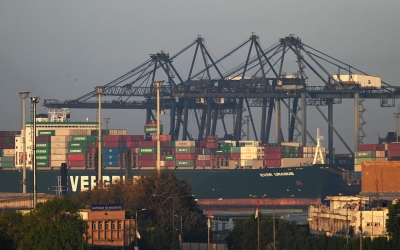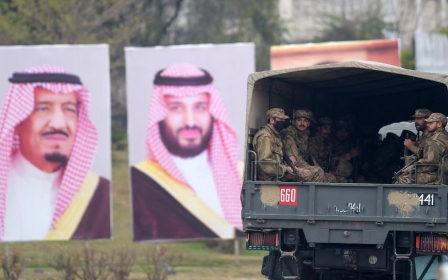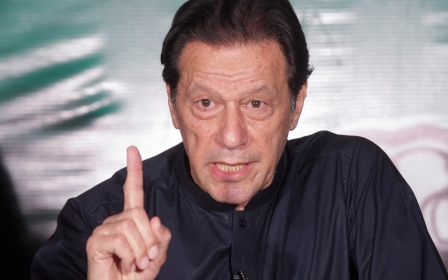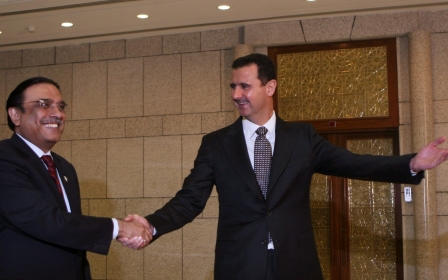Pakistanis flee for the Gulf to escape economic crisis at home

Up until a year ago, life in Pakistan was good for Talha Khan, a digital marketing expert. Work was plentiful, bills were being paid on time, his son was going to school, and the 35-year-old was adding significantly to his savings every month.
But then last April the country was thrown into political chaos, when Imran Khan was dismissed as prime minister by a vote of no confidence, and later detained on corruption charges.
The unrest only worsened an already dire economic situation, leaving heavily indebted Pakistan to grapple with one of the worst financial crises in its history, and pushing young people to look for work abroad.
Under Khan’s successor, Shebaz Sharif, the government has had to carry out painful reforms to secure funding from the International Monetary Fund (IMF), amid historically high levels of inflation.
Talha Khan told Middle East Eye that his work has since all but dried up. The sharp hike in the cost of living has forced him to pull his young son out of school, and replace his car with a motorbike to save on fuel, all the while his family feels the monthly shock of high electricity bills.
New MEE newsletter: Jerusalem Dispatch
Sign up to get the latest insights and analysis on Israel-Palestine, alongside Turkey Unpacked and other MEE newsletters
"Almost all my major Pakistani private or public sector clients tell me that they are cutting costs and that there is no more work available for now and in the near future," he said.
"Everywhere you look, businesses are shutting down and unemployment is rising. I don't see how any foreign investors will invest here, even local investors are leaving; the situation is bad and it will get worse."
Seeing no future for himself in Pakistan, Khan says he is eyeing the Gulf, pointing to the economic boom in the United Arab Emirates and Saudi Arabia.
Like many other Pakistanis, believes he can do well there.
"A few of my friends have already moved there and seem to be doing well. My wife and I are both looking for work there," Khan said. "We've heard Gulf countries have introduced new visas for highly skilled immigrants and we want to make the most of it."
'Despondency'
Since April last year, according to figures from the Bureau of Emigration, 700,000 Pakistanis moved to Saudi Arabia, 229,000 to the United Arab Emirates, over 100,000 to Oman, and around 90,000 to Qatar.
Meanwhile, Pakistan's passport authority last week reported a spike in the average number of applications received per day, from 24,000 to 40,000.
Political analyst and journalist Imtiaz Gul told MEE that chronic political and economic instability has engendered deep despondency among the younger generations of the country.
"I know a lot of people who have either already moved abroad or are in the process of selling their assets to move away; this is unprecedented," he said.
What's also unprecedented is that in the course of a year, Pakistan's GDP growth rate has gone down from 6.1 percent to somewhere around 0.3 percent, while large-scale manufacturing has seen a recession, wth growth falling from 10.6 percent last year to -8.11 percent.
Major car manufacturers in the country have reported an 80 percent drop in sales over the past year, while a severe clampdown on imports, carried out to stem the outflow of foreign exchange, has crippled the textile sector, rendering nearly seven million workers jobless.
Gul said the sharp increase in highly skilled workers leaving the country points to a lack of trust in the current system.
"Over the last 30-40 years there has been a constant stream of mainly unskilled workers travelling to the Gulf to feed the construction boom there, but now, alarmingly, we're seeing highly skilled people leave the county in much larger numbers," he said.
According to government figures, 37,000 managers, 34,000 technicians, 22,000 accountants and engineers, and 8,000 doctors and nurses left Pakistan in the past year.
'The skills gap is getting bigger and more acute, it's already affecting Pakistan's enterprise capacity'
- Imtiaz Gul, analyst
While rejecting the negative implications of highly skilled workers leaving the country, outgoing federal minister for labour and overseas Pakistanis, Sajid Hussain Turi, instead boasted of the performance of his ministry at a press conference earlier this month, hinting that skilled emigrants would boost Pakistan's foreign exchange remittances.
Political analyst Gul says, that, unfortunately, this is a laughable idea.
"Any sensible person would only laugh at this argument. These highly skilled people would have built Pakistan's internal resilience. Remittances is not a source of regular income, no country should purely rely on it," he said.
"These are the people who should be serving the industry and services sectors here rather than abroad."
Flight of skills
Economist and former government advisor, Kaiser Bengali, says when skilled emigrants leave, they often take their families with them, which means that remittances don't come through anymore.
"The skills gap is getting bigger and more acute, it's already affecting Pakistan's enterprise capacity and killing off our skill capacity. Whenever foreign investment returns to Pakistan, they will see there is a skilled labour gap," Bengali said.
He added that high-tech industry doesn't come to Pakistan because the country does not possess the relevant skill capacity.
"The skills shortage is already being felt. I know a power generation company saying that it is becoming increasingly difficult for them to operate here as some of their essential technicians have left," Bengali said.
'I just want to earn a decent wage, and get my son back in school, if that means I have to leave the country, then so be it'
- Talha Khan
In the long term, Bengali says, without skilled labour, Pakistan cannot develop as a country.
"You can't just have foreign expertise coming in and building your infrastructure and then leaving. Then of course you have to pay them in foreign exchange and if you're not earning that then you can't pay them," he said.
Additionally, he added, when highly skilled people emigrate, they also take their GDP contributions with them.
"This affects the GDP. If the rate of industrialisation stays stagnant, then the GDP will go down, and the tertiary sector will be affected. If a factory shuts down, all support services will be impacted too," Bengali said.
Between love for his country and joining the brain drain, Khan feels conflicted. He does, however, remain deeply disillusioned by the state of affairs in Pakistan.
"I just want to earn a decent wage, get my son back in school and have a normal life - if that means I have to leave the country, then so be it."
Middle East Eye delivers independent and unrivalled coverage and analysis of the Middle East, North Africa and beyond. To learn more about republishing this content and the associated fees, please fill out this form. More about MEE can be found here.





